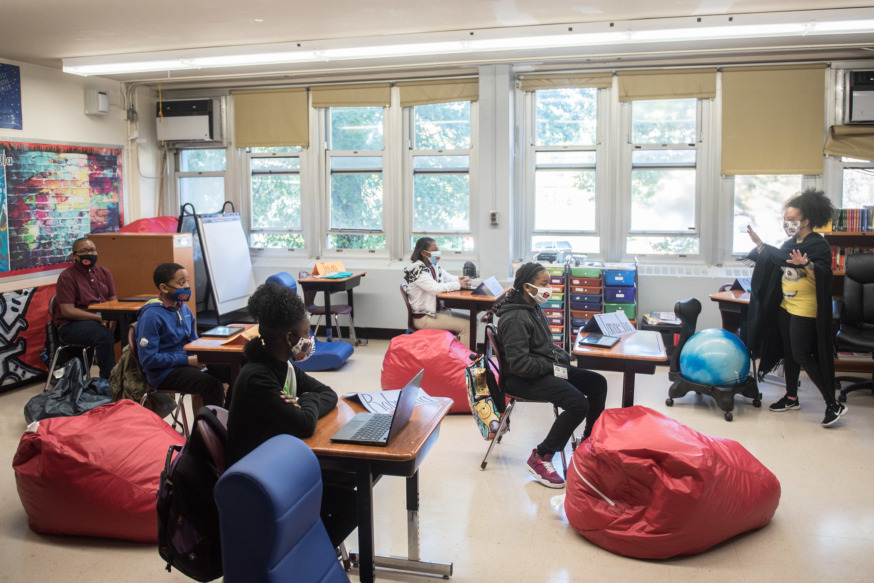
Students spaced apart and wearing masks at a New York City public school (Michael Appleton/Mayoral Photography Office)
July 30, 2021 By Ryan Songalia
A bill was introduced in the city council Thursday that aims to limit class sizes as a means to reduce the spread of COVID-19.
The bill, sponsored by Council Education Committee Chair Mark Treyger and Council Speaker Corey Johnson, would raise the minimum per person classroom space to 35-square feet for grades 1-12. The current minimum space is 20 square feet—though pre-K and kindergarten classes are already subject to the 35-square foot standard.
Most public school classrooms in New York City are between 500 and 750 square feet in size. Under the new guidelines, a 500-square foot classroom would be capped at 14 students, while a 750-square-foot room would be capped at 21.
The goal is to reduce the number of children in classes so ventilation systems can move fresh air through classrooms and other school spaces at the minimum recommended rate of 10-15 cubic feet per minute per classroom.
“We are still facing a serious pandemic and there is an increasing possibility that COVID variants will be with us for years to come. To help make sure that public school classrooms remain safe places, we need stricter space limits for all students, not just the city’s youngest,” Councilmember Treyger said.
Though only Treyger and Johnson are listed as sponsors, Daniel Dromm, the Council Finance Chair, has also voiced his support for the bill, saying it ensures the safety of students and faculty.
“The incorporation of a smaller class size will ultimately benefit the future learning and health of all NYC school children,” said Councilmember Dromm, a former school teacher who represents Jackson Heights. “Due to overcrowding in many districts such as mine, this initiative will be challenging but also worthwhile.”
The new measure would likely require the city to add schools or build annexes to existing school buildings. It would also require more teachers.
The measure is backed by the United Federation of Teachers, the labor union representing most of the city’s public school teachers.
“Making sure that we are not cramming too many children into each classroom is an important step to reassuring parents that we have learned from this pandemic, that it is not business as usual,” said UFT President Michael Mulgrew.
All public schools would have to be compliant with this legislation by September 2024, with 33 percent being expected to meet the guidelines by the start of the 2022-2023 school year, followed by 66 percent the following year. The bill also would require that the Department of Education provide an annual report to track the city’s progress on meeting compliance.
The bill has been referred to the council’s education committee.
New York City public schools will be reopening entirely for in-person classes when school resumes in September. Students, teachers and other faculty will be required to wear masks indoors.






